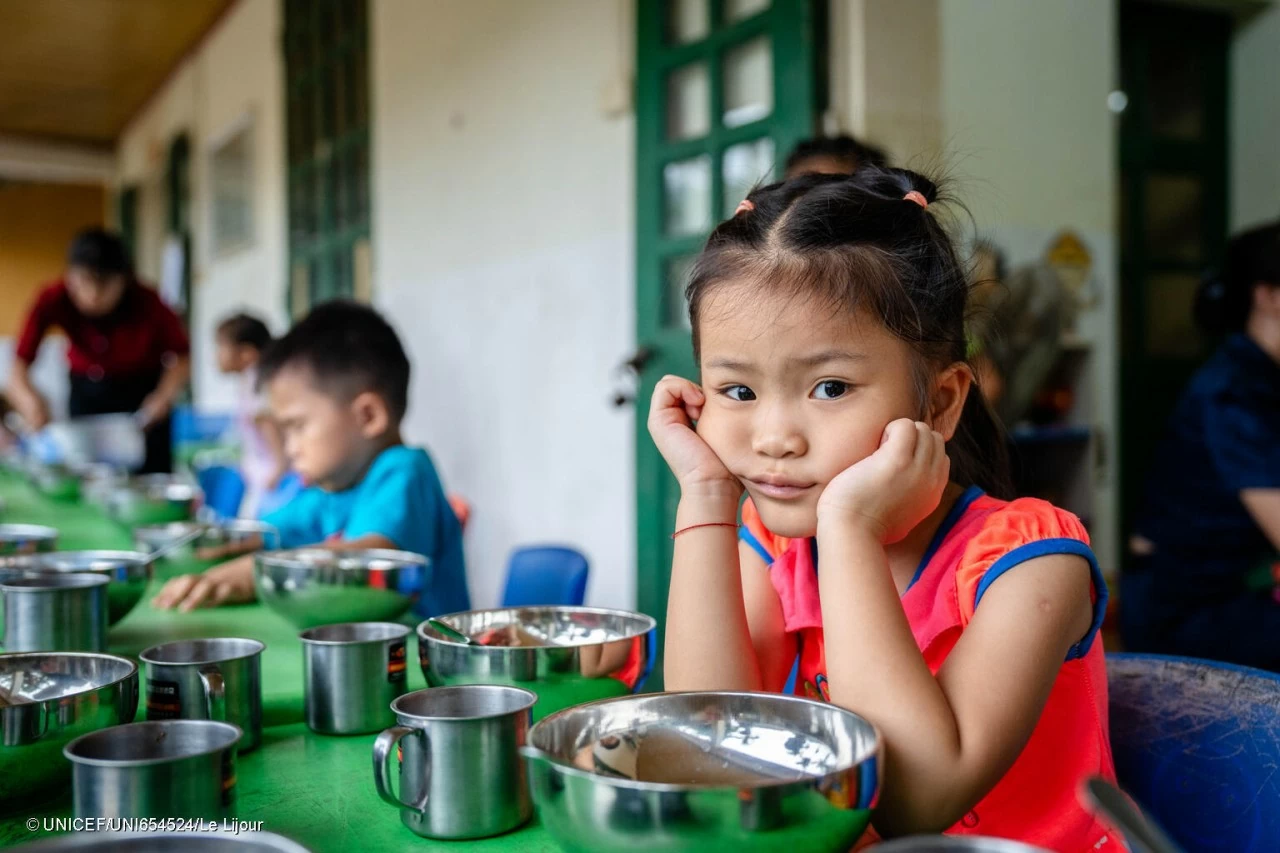
One month since super Typhoon Yagi, learning loss affecting 1.3 million children across Southeast Asia: UNICEF
Latest
One month after super Typhoon Yagi swept through Southeast Asia, nearly 1.3 million children are facing major setbacks to their learning due to damaged or closed schools, flooded homes and displaced families. Thousands of schools in Vietnam, Myanmar, Laos, and Thailand have been affected, leaving children without safe learning environments, nutritious meals, and vital psychosocial support.
 |
| A child waits to eat after playing with toys of the UNICEF-supplied early childhood education kit in a kindergarten in Nu village, one of the hardest hit villages by Typhoon Yagi in Vietnam. (Photo: UNICEF) |
“Schools provide essential protection and stability for children, acting as safe havens for learning and play,” said June Kunugi, UNICEF Regional Director for East Asia and the Pacific. “Missing even a few weeks of school can impact children’s education, well-being, and future opportunities, perpetuating cycles of disadvantage and inequality. Restoring learning in school settings as fast as possible is vital for reestablishing stability and ensuring children can thrive.”
Typhoon Yagi, one of the strongest storms to hit the region in decades, has left a trail of destruction that continues to unfold. According to the most recent assessments conducted in the worst-hit areas, ongoing heavy rains, floods, and landslides have affected over 5.3 million people, including at least 1.5 million children.
With many schools damaged or closed, children are forced to study in temporary spaces that may not be equipped for proper learning. Others – like students in some provinces of northern Thailand – are facing uncertainty about their return to school. This extended period of missed learning can lead to gaps in knowledge, decreased academic performance, and an increased risk of children falling behind or even dropping out altogether. For many, the situation increases stress and makes focusing on studies harder.
In Vietnam, 1,607 schools were damaged, leaving over 960,000 children facing learning disruptions due to school closures and loss of educational supplies. In Laos, 90 schools have been affected due to severe flooding, leaving over 20,000 children in need of support for essential supplies, including school kits, educational materials and furniture, to ensure their timely return to school. In northern Thailand, 555 schools have been affected, impacting over 19,000 students and prompting teachers to shift to online learning and personally deliver study materials to students' homes. In Myanmar, about 300,000 children have been directly affected by the floods, with many schools closed, damaged, or being used as temporary shelters, exacerbating the hardships faced by children already enduring the brunt of ongoing conflict.
In response, UNICEF is working with governments and partners to deliver life-saving supplies, rehabilitate damaged schools, and ensure children can return to learning as soon as possible. In Laos, over 1,600 school kits will be distributed to early childhood education and primary school students, with plans to support more than 1,000 through temporary child-friendly spaces that provide learning and psychosocial support. In Myanmar, essential teaching and learning supplies are being provided, along with mental health and psychosocial support for flood-affected children. In Thailand, back-to-school kits are reaching 3,350 children to support continued learning, and over 8,000 children will receive psychological first aid.
Meanwhile, in Vietnam, UNICEF is collaborating with the Ministry of Education and Training and its provincial departments to provide learning materials to over 23,000 children. In addition, UNICEF is working with the Government of Vietnam to train health workers, teachers, and school staff to strengthen emergency preparedness and address psychosocial needs.
UNICEF continues to collaborate with governments and partners to integrate disaster risk reduction and climate change adaptation activities into essential services for children, ensuring their safety and well-being in an unpredictable environment. This effort includes developing programmes that not only address the immediate needs of children but also build their resilience for the future.
Children in East Asia and the Pacific are increasingly vulnerable to environmental hazards, with extreme weather events in the region rising sharply over the past five decades. The rising frequency and cumulative impact of climate-related events weather events disrupts vital social services for children – such as education, healthcare, and water systems – leading to immediate dangers and long-term setbacks that hinder their development and well-being.

















